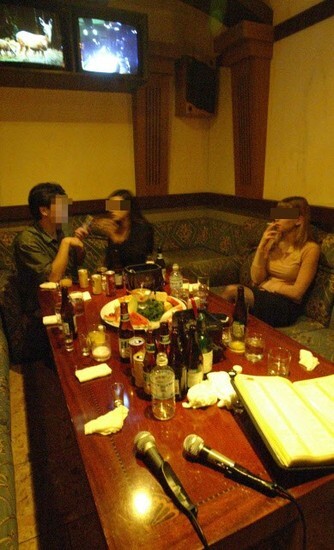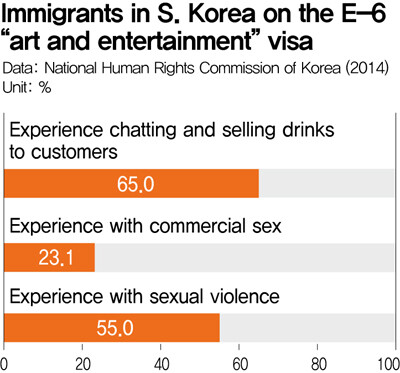hankyoreh
Links to other country sites 다른 나라 사이트 링크
S. Korea still failing to effectively fight human trafficking

Jessie, as we will call her, had been in a band in the Philippines before she came to South Korea. She was under the impression that she could make money singing - but no one said that singing would not be the only work required of her.
“I worked 24 hours a day. I had to collect ‘bar fines’ without any days off,” Jessie said.
A “bar fine” refers to the money that a male customer pays to a brothel for sex with a prostitute. For every 150,000 won (US$120) that customers paid the brothel, Jessie got 45,000 won.
The story above dramatizes some of the findings of a study carried out in 2014 by the National Human Rights Commission of Korea about immigrants who have come to Korea on the E-6 “art and entertainment” visa. Also known as the “celebrity visa,” the E-6 is a two-year visa issued by South Korea‘s Justice Ministry to foreign nationals who are in South Korea to perform in a concert or provide some other form of entertainment. Depending on the activity, this visa is subdivided into the art and entertainment visa (E-6-1), the hotel entertainment visa (E-6-2) and the sports visa (E-6-3).
The E-6-2 visa, which is issued to people who perform at bars and clubs, is often abused to entice or coerce women from the Philippines and other countries into prostitution. The South Korean government is under fire for being reticent to find a lasting solution to this problem, even though the abuse is continuing today.
On Feb. 23, the E-6-2 Visa Alternative Network, which was set up by Advocates for Public Interest Law (APIL) and other groups, held a policy debate at the Franciscan Education Center in central Seoul at which the network announced the results of a fact-finding study about human trafficking in Japan.
“The Japanese government used to also be involved in human trafficking of migrant women from the Philippines through an ‘entertainment visa’ system just like the South Korean government. But after Japan implemented aggressive reforms in 2004, the numbers sharply declined,” the group said.
The Japanese government undertook the reforms in question after the US State Department urged Japan to address the human trafficking issue in its yearly human trafficking report in 2004. The Japanese government subsequently revised the laws in question by adding a definition of human trafficking in its immigration management law and tightened regulations on brokers that brought foreign nationals into the country and on the businesses that hired them.

As a result of these regulations, 800 of the 1000 companies recruiting these women and most of the bars and clubs that had hired them were found to be unfit for the industry. In 2000, there had been around 60,000 Philippine nationals in Japan on the entertainment visa, but after 2005, that number plunged. Today, the yearly number of Filipinos on the visa hovers between 2,000 and 3,000.
In 2001, South Korea was also categorized by the US State Department as a “tier three country” that did not comply with the minimum standards for eliminating human trafficking, but South Korea’s response was different from Japan’s.
“In 2003, the Korean government stopped issuing visas to Russian female dancers, and it tightened the standards for designating foreign-only clubs. But the exploitation is continuing, with Filipino women taking over from the Russian women,” said So Ra-mi, a lawyer with the Gonggam Human Rights Law Foundation who participated in the debate.
Since 2003, the number of E-6-2 visa holders in South Korea has hovered around 4,000 per year on average.
“As long as the majority of migrant women with E-6 visas are being exposed to sexual exploitation, the government ought to take action to reform the visa system,” So said.
“We need to guarantee that these women meet the requirements for a stable sojourn and to take measures to provide them with shelters and assist them with their livelihood to make it easier for the victims of human trafficking to ask for help,” said Shin Ji-won, a sociology professor at Chonnam National University.
By Um Ji-won, staff reporter
Please direct questions or comments to [english@hani.co.kr]

Editorial・opinion
![[Column] Has Korea, too, crossed the Rubicon on China? [Column] Has Korea, too, crossed the Rubicon on China?](https://flexible.img.hani.co.kr/flexible/normal/500/300/imgdb/original/2024/0419/9317135153409185.jpg) [Column] Has Korea, too, crossed the Rubicon on China?
[Column] Has Korea, too, crossed the Rubicon on China?![[Correspondent’s column] In Japan’s alliance with US, echoes of its past alliances with UK [Correspondent’s column] In Japan’s alliance with US, echoes of its past alliances with UK](https://flexible.img.hani.co.kr/flexible/normal/500/300/imgdb/original/2024/0419/2317135166563519.jpg) [Correspondent’s column] In Japan’s alliance with US, echoes of its past alliances with UK
[Correspondent’s column] In Japan’s alliance with US, echoes of its past alliances with UK- [Editorial] Does Yoon think the Korean public is wrong?
- [Editorial] As it bolsters its alliance with US, Japan must be accountable for past
- [Guest essay] Amending the Constitution is Yoon’s key to leaving office in public’s good graces
- [Editorial] 10 years on, lessons of Sewol tragedy must never be forgotten
- [Column] A death blow to Korea’s prosecutor politics
- [Correspondent’s column] The US and the end of Japanese pacifism
- [Guest essay] How Korea turned its trainee doctors into monsters
- [Guest essay] As someone who helped forge Seoul-Moscow ties, their status today troubles me
Most viewed articles
- 1[Column] The clock is ticking for Korea’s first lady
- 2Hong Se-hwa, voice for tolerance whose memoir of exile touched a chord, dies at 76
- 3After 2 months of delayed, denied medical care, Koreans worry worst may be yet to come
- 4[Column] Has Korea, too, crossed the Rubicon on China?
- 5US overtakes China as Korea’s top export market, prompting trade sanction jitters
- 6Samsung barricades office as unionized workers strike for better conditions
- 7All eyes on Xiaomi after it pulls off EV that Apple couldn’t
- 8[Correspondent’s column] In Japan’s alliance with US, echoes of its past alliances with UK
- 975% of younger S. Koreans want to leave country
- 10[Correspondent’s column] The US and the end of Japanese pacifism